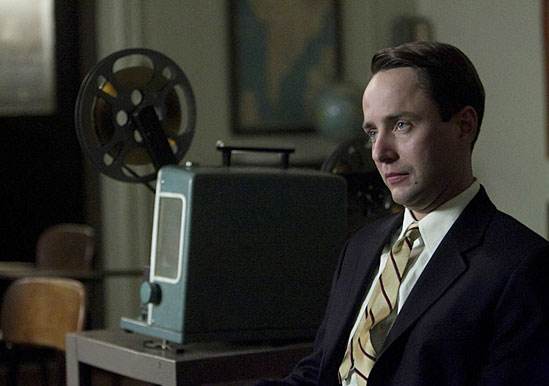
"Megan, meet my previous life. Previous life..."
‘The evil that men do lives after them,’Act Three, Scene Two, Julius Caesar by William Shakespeare.
‘There’s my Don Draper. I like him when he’s a cad.’My wife, Sunday April 9th, 2012.
As has become standard operating procedure for Mad Men, the third episode of the season marks a dramatic turn for the characters and a sign that the creative team behind the show has hit their stride.
In Season One, ‘Marriage of Figaro’opened with Don sniffing at the Volkswagen Lemon ad and then pinwheeling after an old war buddy called him Dick Whitman. In Season Two, Don fell off the monogamy wagon in ‘The Benefactor’. Season Three saw Don swap stories and Old Fashioneds with an intriguing older man who turns out to be Conrad Hilton of the Hilton family in ‘My Old Kentucky Home’, which plays out (disastrously) over the rest of the season. In ‘The Good News’, Don visited Anna in L.A. again and found out about her cancer which cast a sad shadow over the rest of the fourth season.
Now in ‘Mystery Date’, while we don’t have much in the way of mythology-sculpting events unfold, we do see the satisfying lurch of a complex creative machine snap into place and fire on all cylinders.
Did I mix metaphors there? I don’t care–that’s how much I loved the episode. While I have my reservations (more on that later), they aren’t nearly enough to dampen my enthusiasm. If ‘A Little Kiss’was overlong and uncertain, and if ‘Tea Leaves’was workmanlike and flirted with the most lamentable of serial TV hoariness of waiting out biopsy results, ‘Mystery Date’brought together the cultural anxieties of an era and played them out in the kitchens and offices of people we could relate with, and might actually have been.
‘Lurid’isn’t a word I’d often associate with the show, but it is apt for an episode that uses the then-unsolved Richard Speck nurse murders as a backdrop. Social unrest has played out on the rear burner a few times, and isn’t far from sight here either (with numerous mentions of race riots, five that summer and Watts the year before), and the iniquity of women’s roles in mid-20th century America has always been fine dramatic grist, but it has never been so boldly underlined as it was this week with many female characters sifting through the grisly details of the torture, rape and murder of eight student nurses on a hot Chicago night.
Was it hot? I’m not sure–it was mid-summer and seemingly every time women discuss the details of the horrific crime, their foreheads are covered with a thin sheen of sweat. Although given the specifics of the crime, the ladies (including an insistent Sally Draper) could have been sitting in a meat locker and they’d still break out in a sweat.
Most interesting, as is often the case, is Don’s internal struggle. After bumping into an ex-fling of his in the elevator with wife Megan, Don can’t apologize enough for his past life. This has version of him, the one trying very hard to be a good husband that we’ll call Upright Don, is not terribly interesting. My wife gave fine voice to the concern, pining for the return of Rakish Don. It’s not difficult to imagine the writer’s room tussling with this, like fretting over an addict friend’s fragile recovery–while you want nothing but the best for him, you might secretly miss the roulette-wheel thrill of a three a.m. phone call from him, or at least the vicarious rush of a morning after anecdote.
This is where I get to my reservations. While the stage is impeccably set for the fever-dream freak out Don deals with in the final act of the show–nurse murder stories and a wife bent over crime scene photos, persistent flu symptoms and, most canny of all, presentation of the dream sequences without a wink or nod that they might not be real–it rang hollow. To me, it felt much like an opportunity to see Don cavorting around with another woman in his matrimonial bed without the impending threat of real consequences. As dry as the dream sequences with the woman from the elevator are, I never once believed they were happening. The true crescendo of violence and desultory heel-kick of a body beneath the bed, while rich and satisfying metaphorically for a man hoping to bury his past (yet again), sprang from an opportunity to see Rakish Don have his fun.
Although, following it up with a Frenzy-like strangulation did make me forgive it–as if Weiner and team were making a salient point about the wages of sin, as much for the audience as for Don himself.
Interesting to note:
Peggy’s friend Joyce Ramsay (Zosia Mamet) drops a Biblical reference when mentioning the one student nurse who escaped Speck’s clutches: ‘I am only escaped alone to tell thee.’Job 1:15.
Peggy mentions to Don’s new secretary Dawn (Teyonah Parris) that she was discovered at Sterling Cooper, ‘Like Esther Blodgett’, a reference to A Star is Born (1937, 1951 [on TV], 1954, 1954, 1976) where a young woman is plucked from obscurity and thrust into stardom as her mentor’s star declines. Foreshadowing for alternate trajectories for Peggy and Don?
Possibly creepier than any other aspect of this episode is The Crystal’s ‘He Hit Me and It Felt like a Kiss’that plays over the end credits. It was written by Gerry Coffin and Carole King after they discovered that singer Little Eva was in an abusive relationship. Produced by Phil Spector, the haunting song offers little in the way of blatant comment on the evils of such a relationship, but the elegiac production that surrounds this document of a woman’s wayward (if unfortunately standard) thinking that physical abuse is somehow motivated by love. It was released in 1962 but was soon pulled from the air over protests that it endorsed physical abuse.
Like what you’ve read? Sure you did! Jump over to Amazon to get my book Kings of Madison Avenue: The Unofficial Guide to Mad Men
And you can always find me at jessemclean.ca
 Follow Us
Follow Us




